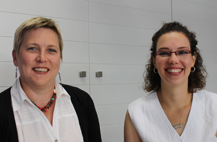Latest News Archive
Please select Category, Year, and then Month to display items
06 April 2018
Photo Rulanzen Martin
 From the left: Dr Thulisile Mphambukeli, leader of the BRICS research team that is exploring the political economy of water and food security, and her research partner, Dr Victor Okorie.
From the left: Dr Thulisile Mphambukeli, leader of the BRICS research team that is exploring the political economy of water and food security, and her research partner, Dr Victor Okorie.
A Brazil, Russia, India, China and South Africa (BRICS) delegation is to hold the 10th Annual BRICS Summit in the last week of May 2018 in Johannesburg. Dr Thulisile Mphambukeli, leader of the University of the Free State (UFS) research team alongside Dr Victor Okorie from the Department of Urban and Regional Planning, in collaboration with Prof Lere Amusan of North-West University, will ensure that water and food security is a prominent feature on the gathering’s agenda.
First, the project titled: “Exploring the political economy of water and food security nexus in BRICS and Africa” will debut at the National Institute for the Humanities and Social Sciences BRICS Think Tank Forum”.
According to Dr Mphambukeli, the key to water security is attitudinal change by means of education and conscientisation. This, she is adamant about, holds the potential to drive behavioural adjustments in the way society interacts with water.
Genetic and social approaches
Dr Okorie asserts that if strides towards reducing the demand for water were to be made, research efforts should be geared towards effecting changes at DNA level. Meaning we need to explore waterwise ways that enable crops and animals to thrive optimally.
The project also looks at social dimensions of water such as flushing a toilet. “Research activities on redesigning toilets, especially the urinal, where more than nine litres of water are used to flush less than one cubic centimetre of urine, are timely in the context of managing water and the food nexus crises,” said Dr Okorie.
Combining the genetic and social approaches would allow us to produce more with a smaller water footprint. This can be made possible by implementing precision agriculture which is about estimating and applying exact quantities of water and nutrients needed for the production of crops or the raising of livestock.
Paradigm shifting policies
Prof Amusan said the team intended to propose functional solutions that take the quality of water into consideration. Equitable production and distribution of water depends on endorsing policies of co-production between citizens, governments and the public sector. BRICS member states mutually consider water and food security as an issue of paramount significance, hence its feature on this prestigious summit’s agenda.
Two Kovsie women involved in international sports events
2012-05-14
 |
|
Hetsie Veitch and Ebeth Grobbelaar
Photo: René-Jean van der Berg
14 May 2012
|
The organisers of two international sports events will depend on the expertise of two Kovsie women to make the events a major success.
The honour to be involved in international sports event has befallen Ms Hetsie Veitch and Ms Ebeth Grobbelaar.
The honour is the result of many years’ hard work and devotion in their respective fields.
In June, when the USA chooses the team to represent it at the 2012 Paralympic Games in London, Ms Veitch will be one of the classifiers who will determine in which categories athletes may compete.
Ms Veitch, Head of the Unit for Students with Disabilities at the University of the Free State (UFS), has been invited to be a member of the Classification Panel at the final USA Paralympic athletics trials. The trials take place from 27 June to 1 July 2012 in Indianapolis, Indiana, in the USA.
Ms Veitch and four other classifiers, two from Brazil, one from Canada and one from the USA, will test and verify the international classification status of the American athletes. No athlete will be allowed to take part without their classification being verified by the panel.
Ms Veitch, who recently achieved the status of International Paralympic Committee (IPC) Athletics Classifier, the highest achievement for a classifier in sport for the disabled, said that this category of sport has always been her passion.
“To have the opportunity to be involved in the classification of the USA team for the London 2012 Paralympic Games is a huge honour. I am going to start working on being chosen for the official IPC classification panel for the 2016 Paralympic Games in Brazil.”
Ms Grobbelaar, Assistant Director of the South African Testing Laboratory for Prohibited Substances at the UFS, was invited to be involved in the Drugs Control Centre in the unit against prohibited substances which will test sportsmen and women during this year’s Olympic Games in London.
Ms Grobbelaar said that even though the future of sportsmen and women would be in her hands, she is totally capable of carrying out the task that awaits her.
“I will be part of the laboratory team who will test the athletes’ samples for prohibited substances. I was part of the South African team who tested samples in our own laboratory in 2010 during the FIFA Soccer World Cup, as well as for the All Africa Games. The task is one I perform every day in our own laboratories. Each sample that I analyse determines an athlete’s future. The circumstances during the Olympic Games are different, but the work remains the same.”